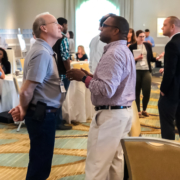Want to Keep Your Millennials — Mentor Them
Written with Bridget McKeogh
There seems to be a profound disconnect in the workforce between Millennials (1984 – 2012), Generation Xers (1965 – 1983), Baby Boomers (1946 – 1964) and Greatest Generation/Traditionalists (1930 – 1946). The complaints are rampant.
But there is also something pretty clear across the board that we can all own. Every Gallup study shows that the overall workforce is disengaged to some extent. Yes, that means you or someone who works in close proximity to you is likely counting the minutes to five pm. Last week Gallup reported that the U.S employee engagement average for November was 32.1%. That’s one out of every three people! And the number ticks up higher the older you are. In 2014 Gallup reported Traditionalists have 42.2% engagement, 32.7% for Baby boomers, 32.2% for Generation X, and just 28.9% of Millennials report that they are engaged at work.
By 2020, Millennials will become the largest generation in the workforce.
Millennials tend to frustrate corporate America with a sense of ‘entitlement.’ It is widely viewed that they are ‘coddled’ by their Baby Boomer parents, told they could be anything, not willing to pay their dues. One friend, an entrepreneur Julie Beck, shared how she had been so ‘Millennialed’ this year, she even coined the phrase. Two Millennials transitioned in unprofessional manners, one by a text message! Don’t they care about having a positive reference? Millennials tend to stay in jobs for under two years and don’t seem as motivated by the career track, raises and other incentives that are the mainstay of corporate America.
Over the past few years, I have seen and worked with a great number of Millennials and observed the lack of mentoring the ‘older’ generations are offering them. Why are we not investing? Are we threatened by their confidence, desire to lead? Given our own low engagement scores in the workplace, have we become too cranky?
But let’s go deeper into the issues, the problems, and millennial mentoring as part of the solution to train and retain our newer and high-potential talent:
According to a key study by Intelligence Group (a division of the Creative Artist Agency), we get some keen insight:
72% of Millennials would like to be their own boss, but if they have to work for a boss, 79% would want that boss to serve more as a coach or a mentor. The study also shows that 88% of Millennials prefer a collaborative culture over a competitive culture and they are looking to make a difference in their professional lives. I think of Millennials often as the ‘purpose generation’.
As the workforce shifts, our society is challenged in finding enough STEM talent. STEM talent refers to the skills needed for almost every job (Science, Technology, Engineering, Math). For example, there are millions of unfilled jobs that require STEM skills and STEM jobs tend to pay better (@40% so it’s a much clearer pathway to the middle class and arguably, the American Dream).
Goldman Sachs is among the first to publically put some big cards on the table publicly. On the front page of the Wall Street Journal earlier this month, they asked their Millennials to stay and promised that things will improve by offering clearer paths to promotions, experiences in different banking environments and mandating “No Work Saturdays”.
Another solution: creating Millennial Mentoring Cultures. This is what we focus on around the clock at Twomentor, LLC. Aligning mentoring to the whole fabric of the company, and part of people’s performance reviews. PGi released a study that dove into the millennial mindset. Of those millennials surveyed, 71% stated that they wanted meaningful connections at work and hope to find a “second family” in their coworkers. Additionally, 75% not only want millennial mentoring but deem it crucial for success. In the same survey, 70% of non-millennials say they are open to reverse mentoring. They acknowledge that 20-somethings have first-hand knowledge of social media and other technical practices and older employees want to learn! A majority of Millennials sited “not a good cultural fit” as a reason they left their job in the first three years. To retain the new majority in the workforce, companies need to align culture more to Millennial needs, and perhaps all of our needs to have more meaningful support and connection at work.
AN ECONOMIC BURDEN
Each time you lose someone good, you lose time and money. Forbes reported that the average cost to replace a millennial is 15k-25k. Goldman Sachs isn’t trying to retain Millennials solely out of the goodness of their hearts, retention is a significant economic issue. It’s good for business. Companies pour significant money into recruitment but programming around development and retention is given less attention and some of the behavior patterns of Millennials reflects that.
So bottom line, It’s time to get the human back in human capital.
Companies are made up of human beings not human doings, and an engaged workforce = ROI for the company and the people who make up the company.
The business case for millennial mentoring is so strong that in a Wharton study, people who mentor got promoted 6x more than people who didn’t and mentees were promoted 5x more. …And retention was 20% higher in both groups five years later- YEAH, that’s what we are talking about! Most companies have informal mentoring programs or aspirations, if you want to capture ROI, look at metrics that can be captured- after all, you get what you measure.
The way we see it, there is no downside to millennial mentoring. Mentors and mentees are more engaged and better positioned for advancement. Engagement equals retention and retention saves time and money. Put in a little time and effort now, to save big headaches later. What is there to lose?




